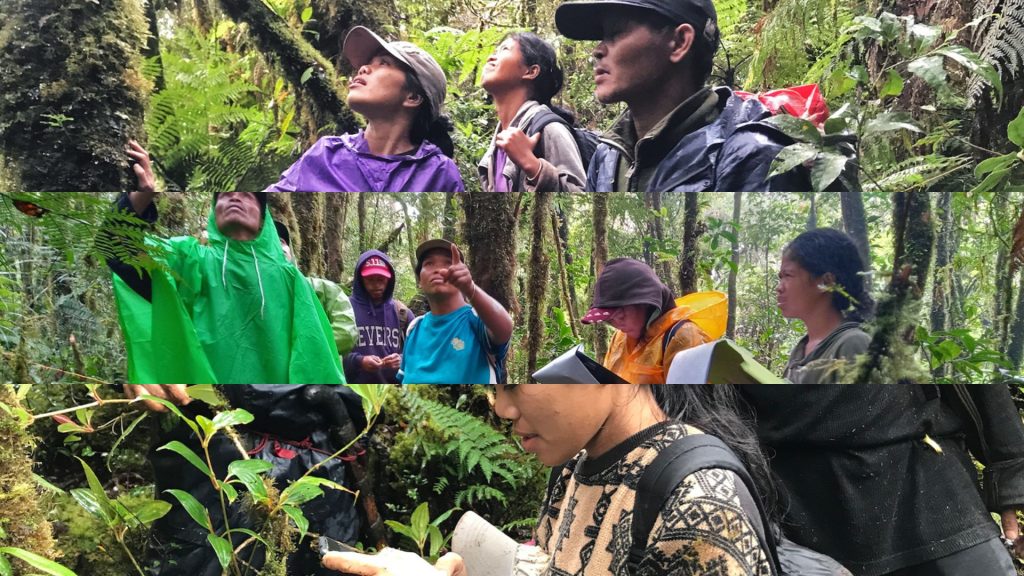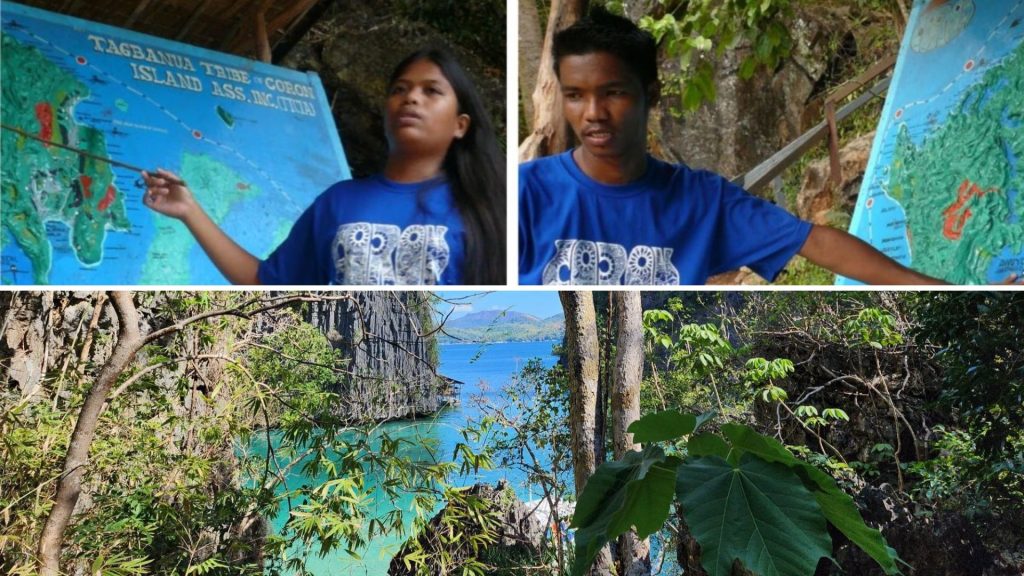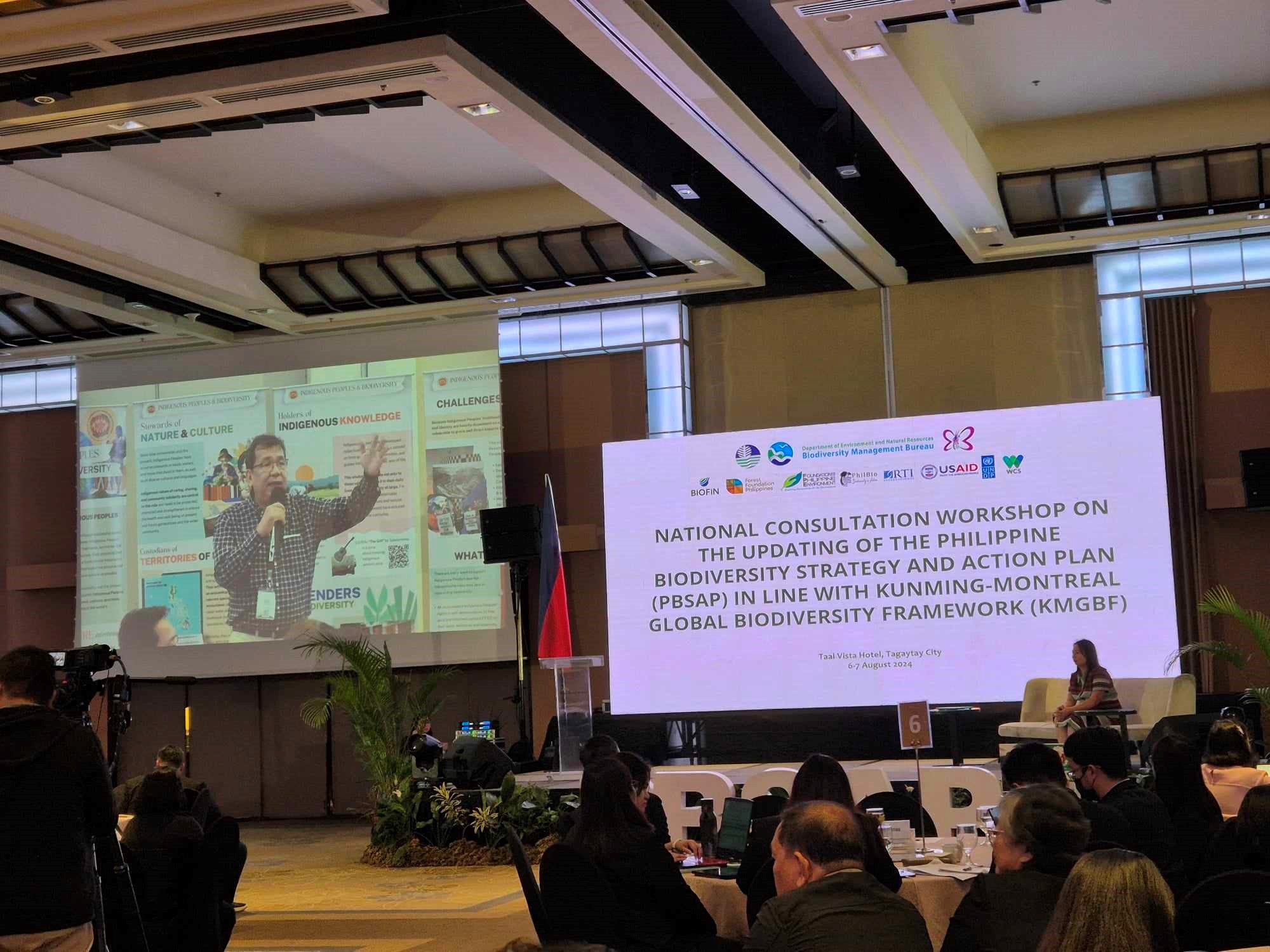Celebrating the Guardians of Biodiversity: Recognizing Indigenous Peoples’ Pivotal Role in Inclusive Conservation in the Philippines
By Michelle Lapiz and Asami Segundo

Photo courtesy of Indigenous Peoples and Biodiversity Coalition Philippines (IPBC Ph)
TAGAYTAY CITY – Indigenous Peoples representatives, environmental advocates, champions of climate and biodiversity action, and other key government agencies headed by the DENR (Department of Environment and Natural Resources) Biodiversity Management Bureau (DENR-BMB) convened for the National Consultation on the Updating of the Philippine Biodiversity Strategy and Action Plan (PBSAP). This event, held on August 6-7, 2024, aims to align the PBSAP with the Kunming-Montreal Global Biodiversity Framework and gather key inputs from different stakeholders including the Indigenous Peoples. This also marked a pivotal moment for Indigenous Peoples in the Philippines as they have submitted landmark contributions to ensure the recognition of Indigenous Peoples in achieving the KMGBF targets. Adding to its significance, the consultation coincided with the International Day of the World’s Indigenous Peoples, which we celebrate every 9th of August.
One of the significant highlights was the turnover of two pivotal policy documents to the DENR-BMB. The Indigenous Community Conservation Areas and Territories (ICCAT) Ordinance were submitted by the PLGU Nueva Vizcaya headed by the ordinance’s principal author, Hon. Sammy Balinhawang, as one of the policy contributions towards Target 3 of the KMGBF. The Indigenous Peoples and Biodiversity Coalition Philippines (IPBC Ph) also turned over the first draft of the Indigenous Peoples Biodiversity Strategy and Action Plan (IPBSAP), a document that was formulated through series of consultations with Indigenous Cultural Communities representatives from all over the Philippines. It outlines the contributions of Indigenous Peoples to all the KMGBF Targets as well as their commitments towards its fulfilment. Non-Timber Forest Products – Exchange Programme (NTFP-EP) Asia and Philippines, as well as the ICCA Consortium Southeast Asia are members of the IPBC Ph. The DENR-BMB through Assistant Director Armida P. Andres, received these documents and expressed the agency’s gratitude and warm acceptance of the two policy documents. She also gave assurance that these two policy documents will reach the office of the DENR Secretary. The National Commission on Indigenous Peoples through Mr. Angelo Sallidao, also expressed their support to these two policy documents. This milestone underscores the recognition of the Philippine government of the vital role and contributions of Indigenous Peoples in conservation, climate change mitigation, and natural resources governance.
Vital stewards of environment
From Tebtebba Foundation’s 2008 policy review on Philippine Indigenous Peoples and protected areas, approximately 85% of the Key Biodiversity Areas (KBA) in the Philippines are located within the ancestral domains of Indigenous Cultural Communities (ICCs) and Indigenous Peoples (IPs). Governed by traditional knowledge systems and practices, these areas house rich biodiversity which is the habitat of many wildlife and are providing ecosystem services to the communities inside and outside of the indigenous territories.
The connection between Indigenous Peoples and their land is deeply rooted in their cultural and spiritual beliefs, fostering a unique perspective on conservation where environmental health is intertwined with community well-being. Traditional practices such as rotational farming, controlled burning, and observance of sacred grounds exemplify Indigenous methods that sustain biodiversity and bolster ecological resilience. These areas being protected and conserved by Indigenous Peoples are called Indigenous Communities Conserved Areas and Territories (ICCAs or ICCATs).
The ICCATs Ordinance of the province of Nueva Vizcaya recognizes ICCATs in the province and aims to strengthen its conservation by setting up a provincial registry. This ordinance also recognizes that the ICCATs are owned and must be managed and controlled by the ICCs/IPs who own the land. Traditional governance systems within these territories are pivotal in maintaining ecological balance and ensuring sustainable resource utilization.
The Indigenous Peoples Biodiversity Strategy and Action Plan (IPBSAP)

The IPBSAP stands as a pioneering document, encapsulating Indigenous Peoples’ perspectives, commitments, and action plans to contribute to the KMGBF Targets. Jill Cariño of Partners for Indigenous Knowledge Philippines and representative of the IPBC Ph, hailed the IPBSAP as “a groundbreaking document, the first ever of its kind,” as it is the first indigenous-led document that outlined commitments and contributions of IPs in the KMGBF Targets. It was formulated through a series of consultations with Indigenous Peoples representatives from all over the country and with the support of civil society organizations. The formulation of the IPBSAP and the government’s acceptance of it is a significant step towards inclusive conservation in the country.
Jill Cariño delivering her speech for the ICCAT Ordinance and IPBSAP document turnover (Photo courtesy of DENR-BMB)
The implementation of the IPBSAP requires ongoing collaboration between Indigenous communities, government agencies, non-governmental organizations, and other stakeholders. This partnership is essential for addressing the complex and interconnected challenges facing biodiversity conservation. Ms. Carino also mentioned that the IPBSAP is a living, breathing document which means that it is still subject to updating. The document was given to the DENR-BMB with high hopes it would be included in the updated PBSAP.
Traditional Knowledge and Biodiversity Conservation
Indigenous Peoples’ intimate relationship with the land through their practice of their respective traditional governance have proven effective in conserving biodiversity and ensuring ecosystem sustainability. Indigenous communities have intricate knowledge systems and practices about the earth that does not just conserve nature but has also deepen their connection to it.
“…traditional practices including their spiritual connections with environment hold invaluable enrichment for conservation efforts. It is imperative that we respect their rights, involve them as key stakeholders and empower them to continue their crucial role in preserving biodiversity.”
(Message of NCIP (National Commission on Indigenous Peoples) Chairperson Sibug-Las during the 1st National Roundtable Discussion on IPs & Biodiversity)
In Northern Mindanao, the Higaunon Indigenous cultural communities of Kimangkil-Kalanawan-Sumagaya-Pamalihi (KKSP) mountain range practice their traditional forest monitoring system called Panlauy where the members of the community would immerse in the forest, observing, documenting, and assessing the condition of the forest ecosystem and any threats to it. Panlauy is preceded by a pagbala (foretelling) ritual led by a datu to seek their guardian spirits’ consent for the conduct of the monitoring activity. Panlauy serves as an intergenerational activity for the elders to pass on their knowledge of their forest to their youth.
Photo courtesy of Indigenous Peoples and Biodiversity Coalition Philippines (IPBC Ph)


Meanwhile, in Coron, Palawan, the Calamian Tagbanwas hold high respect to their lagoons which they call awuyuk. They believe that the awuyuk are the “holy of the holiest” as it is the sanctuaries of the sea-dwelling beings. These waters are so sacred that one must be silent when crossing them or an unfortunate event will happen. For the Tagbanwas, their waters and land are inseparable. This relationship with their land and waters has resulted in an effective conservation of biodiversity of the lagoons’ ecosystems.
Photo courtesy of Indigenous Peoples and Biodiversity Coalition Philippines (IPBC Ph)
Partnerships Towards Inclusive Conservation
As the DENR-BMB received the IPBSAP and the ICCAT Ordinance, several key stakeholders have expressed their appreciation and support to these policy initiatives. Funding organizations have expressed that their organizations are very willing to support further initiatives to localize and improve the IPBSAP. Other partner organizations have also expressed their interest in collaborating towards its implementation. Inclusive conservation entails the inclusion and partnership of different sectors of society. Hence, in celebrating the International Day of the World’s Indigenous Peoples, let us honor their resilience, wisdom, and unwavering commitment to protecting the Earth’s biodiversity by supporting their initiatives and partnering with them towards its success.

Photo courtesy of Indigenous Peoples and Biodiversity Coalition Philippines (IPBC Ph)
The International Day of the World’s Indigenous Peoples is a reminder to the mainstream society that we owe a lot to the unsung heroes who, up to this day, are protecting the world’s biodiversity. It is also a continuous reminder that Indigenous Peoples rights must be recognized, respected, and protected as threats and challenges that endangers their lives and their lands are still present. The IPBSAP and the ICCAT Ordinance are but a testament Indigenous Peoples continue to persist and thrive amidst threats and challenges that they face.



